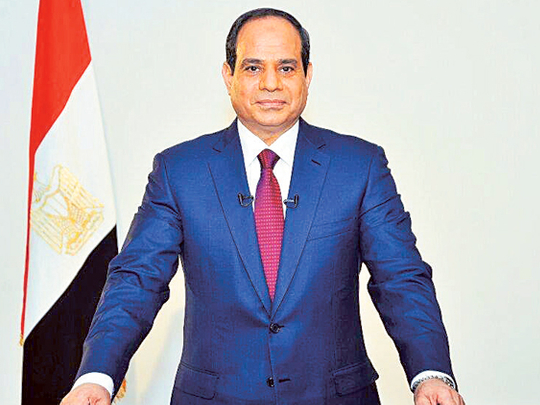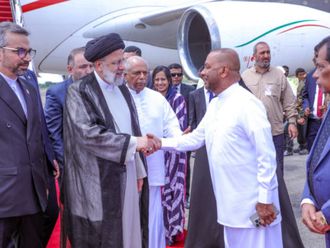
Cairo: Egypt’s new President Abdul Fattah Al Sissi has said that the Gulf security is vital to his country, in a sign of closer ties with the region whose states are staunch financial and political backers of his removal of Islamists from power.
“Egypt realises well that Arab security is a red line. As for the Gulf security, it is an inseparable part of the Egyptian national security,” he said in a speech late on Sunday, hours after he took office.
Saudi Arabia, the UAE and Kuwait have injected billions of dollars into the Egyptian economy since July last year when Al Sissi led the army’s toppling of Islamist president Mohammad Mursi following protests against his troubled one-year rule.
“Egypt gives precedence to the interests of the Arab people and will continue its support for the Palestinian people to obtain their rights,” he told 1,200 Egyptian public figures and foreign diplomats at an inaugural ceremony in the Quba Palace in Cairo.
Pledging that his administration will pursue “balanced, democratic and diverse” ties with the outside world, Al Sissi, a former defence minister said: “We will promote our relations with everyone who backs or will back the Egyptian people’s will. Time of subordination is over. These relations will from now on will be shaped according to how far friends will be ready to cooperate and fulfil the Egyptians’ interests.”
Washington and Cairo have been key allies since Egypt signed a peace treaty with the Israelis in 1979. However, the Egyptian-US ties have deteriorated since Mursi’s ouster, although Washington stopped short of calling his removal a coup.
Al Sissi on Sunday signalled a thaw in relations with Ethiopia after months of strains over the latter’s construction of a dam, which Egypt fears will curtail its water share from the Nile.
“I will not allow the Renaissance Dam project to be a reason for creating a crisis, a problem or an obstacle for the development of Egyptian ties with Africa or sisterly Ethiopia,” he said. He renewed his abidance by Egypt’s international treaties.
Signalling intention to prolong a clampdown on Mursi’s backers, Al Sissi vowed “no reconciliation with those having blood on their hands”.
Egypt has been rocked by deadly violence in the past year, which the military-backed authorities blamed on Mursi’s Muslim Brotherhood that it labelled a terrorist organisation.
“Achieving comprehensive development requires a favourable security environment... So, defeating terrorism and establishing security top our priorities.”
He called for religious institutions to work for spread of moderation in Egypt. “The religious discourse needs change,” said Al Sissi, seen as a pious, moderate Muslim.
“I look forward to seeing the Holy Al Azhar continues its efforts in highlighting the genuine image of moderate and tolerant Islam,” he added referring to the prestigious Sunni Islam institution based in Cairo.
His call came two days after his predecessor Adly Mansour decreed a ban on clerics not appointed by state-sanctioned religious authorities, from giving sermons in mosques, a step mainly targeting ultra-conservative Salafists.
Al Sissi vowed an all-out fight against corruption. “There will be no mercy towards those found guilty of involvement in any case of corruption. Fighting corruption will be our slogan.”
He said he will “be a president for all Egyptians”, reaching out to the Christian minority who complained about persecution under Islamists’ one-year rule.
“Equal citizenship will be the rule in Egypt. There will be no discrimination among citizens in terms of rights and duties.”
He said that his era will usher in a “gigantic economy “and large-scale projects to be launched by the state and private sectors. “This will go hand in hand with safeguarding rights of the poor and developing marginalised areas.”
Al Sissi said he would give particular attention to boosting rights of women, believed to have accounted for the majority of voters who gave him a landslide win in last month’s presidential elections.
“In recognition of women’s effective role in society... I will do my best so that they will get fair representation in the new parliament and holding executive posts.”
Al Sissi will hold legislative powers until the new parliament is elected later this year.
“I promise the average and limited-income people to have a better life during the four years,” he added, referring to his term in office.
He said his priorities also include upgrading education and the healthcare services — two sectors with which many Egyptians are displeased.
He pledged to create favourable conditions for investors and labour-intensive industries in an obvious bid to revitalise the economy wracked by three years of turmoil.
“But the economic development cannot lead to a comprehensive renaissance across the country unless it is matched by social development.”
Al Sissi, 59, is Egypt’s fifth president drawn from the military since a 1952 revolution toppled the monarchy in the country.












